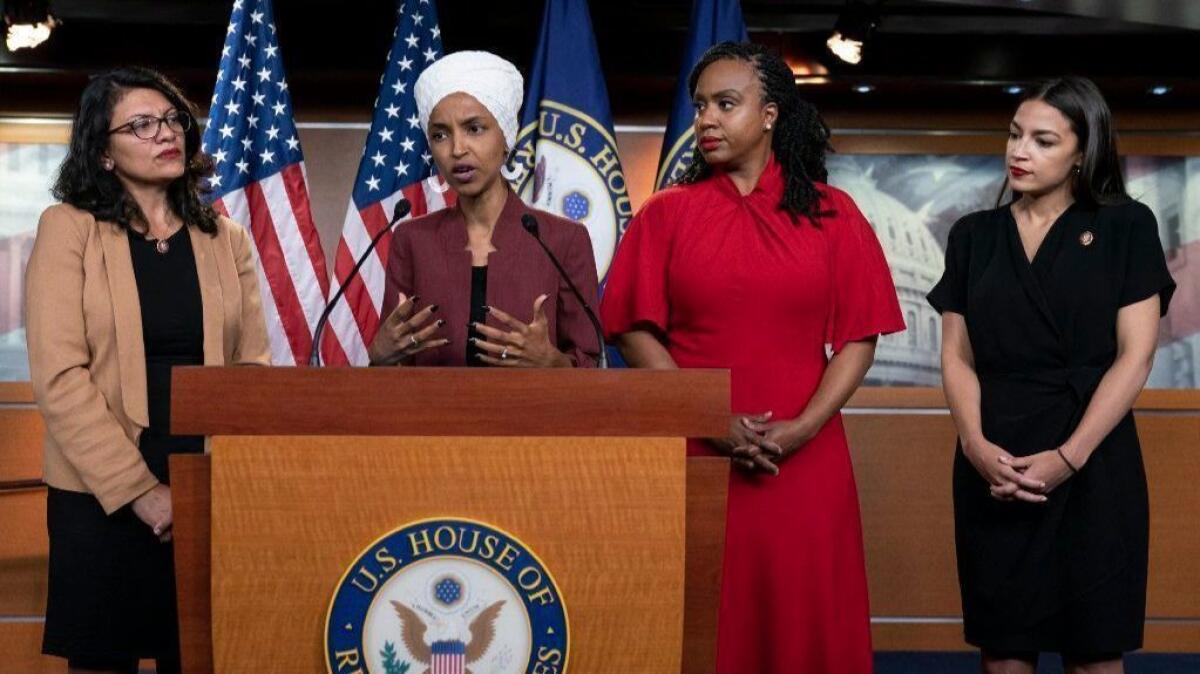House votes to condemn Trump’s tweets as racist

- Share via
WASHINGTON — For all the tumult and anger that President Trump’s verbal attacks on four minority lawmakers have caused, he has been clear about his political motives: Drive a wedge through the country that forces each side to its corner.
Trump is betting he can repeat the formula that won him election in 2016, widening the nation’s racial, cultural and ideological divides to eke out victory with a strong showing among older conservative white voters.
Democrats, who have been debating how much to focus the 2020 election on Trump’s personal behavior, voted in the House on Tuesday evening to condemn Trump’s racist tweet that told four liberal members of Congress — all women of color — to “go back” to the “crime-infested places from which they came.”
The four-page resolution “strongly condemns [Trump’s] racist comments that have legitimized and increased fear and hatred of new Americans and people of color.”
The unusual measure passed 240 to 187, with support from four Republicans and one independent; no Democrats opposed it.
The House was briefly thrown into chaos before the vote when Republicans objected to House Speaker Nancy Pelosi’s (D-San Francisco) use of the word “racist” to describe Trump’s words, which violates the chamber’s rules of decorum. Democrats voted to restore Pelosi’s right to speak in the chamber again before proceeding to the measure condemning Trump.
The vote forced Republicans to choose between condoning the bigotry and facing Trump’s political wrath. Their leaders, including Minority Leader Kevin McCarthy of Bakersfield, have sided with Trump.
“Those Tweets were NOT Racist,” Trump tweeted Tuesday in the lead-up to the vote. “I don’t have a Racist bone in my body! The so-called vote to be taken is a Democrat con game. Republicans should not show ‘weakness’ and fall into their trap.”
Trump’s advisors have long believed the 2020 election would depend on turning out base voters on each side. Whereas some Democrats have hoped to define the anti-Trump vote as a broad coalition, Trump believes he has the best shot if the election pits a smaller group of high-intensity voters against each other.
Democrats, who represent the overwhelming majority of the country’s minorities in Congress, have been appalled by Trump’s willingness to capitalize on the country’s racial divisions for political gain. But they also are being thrust into a debate on Trump’s terms -- with increased chatter about impeachment and the president’s polarizing rhetoric -- even as some in the party believe healthcare and economic inequality can attract more voters.
“He is choosing this turf,” said Tad Devine, a former advisor to Al Gore, John Kerry and Bernie Sanders who is neutral in this year’s Democratic primary. “He does want to have a campaign that is about issues like racism. I don’t think this is accidental. I think it’s deliberate.”
Devine believes Trump is exploiting a small group of voters who tend not to pay close attention to politics but may respond to appeals to their “worst instincts.” But, Devine said, Trump risks losing support from another 5% to 7% of the electorate -- conservative voters who agree with him on economic issues or court appointments but find his personal behavior irredeemable.
Though Trump won in 2016 by tapping into race and immigration, his party lost the House in the 2018 midterms despite his claims that caravans of migrants from Central America were forming an “invasion.”
As the country’s electorate grows more diverse, the math for such appeals grows tougher. Whites made up 71% of those who voted in 2016 and Trump won 57% of them, compared with 37% for Hillary Clinton, according to exit polls. Pew predicts the eligible proportion of white voters will shrink to less than 67% in 2020 as the share of Latino and Asian voters increases.
“Lightning is not going to strike in the same place twice,” said Cornell Belcher, a Democratic pollster who worked in presidential campaigns for Howard Dean and Barack Obama. Trump “needs to broaden his support.”
Belcher believes Trump has little choice — given his persistently low poll numbers — but points out that Democrats won House races in 2018 by 9 million votes combined.
“That’s not a small sum. That is a historic thing and guess what? They didn’t do that just because of the healthcare conversation,” he said. “This is a reaction to what Donald Trump is doing.”
Trump has targeted four minority women elected in the 2018 wave -- Reps. Alexandria Ocasio-Cortez (D-N.Y.), Ayanna Pressley (D-Mass.), Ilhan Omar (D-Minn.) and Rashida Tlaib (D-Mich.). All are U.S. citizens and three were born in this country. But Trump has cast the liberal lawmakers as radicals and outsiders.
“If they want to gear their wagons around these four people,” Trump said Monday, “I think they’re going to have a very tough election because I don’t think the people of United States will stand for it.”
Democrats have rallied around the women - who call themselves “the Squad” - despite internal differences over policy and rhetoric. Omar and Tlaib have both called for impeachment. Omar has referred to the 9/11 terrorist attacks as a moment when “some people did something” and said political supporters of Israel were advocating for “allegiance to a foreign country.”
Pelosi , who has recently sided with her party’s more moderate wing against the squad, has been a forceful defender against Trump, even as she has resisted calls for impeachment and other more aggressive tactics.
“These are our sisters,” she told Democrats in a closed-door meeting Tuesday, according to an aide in the room.
Trump and some of his allies believe the women are out of the mainstream and that Pelosi’s embrace will ultimately backfire for her party.
“They’re highly unpopular around the country, and Trump somehow has Democrats rushing to the floor to defend the socialist-progressive part of their caucus,” said Barry Bennett, a former campaign advisor to Trump. “I don’t know if it’s on purpose or by accident, but it’s helpful.”
Even as some Republicans have condemned Trump, at least some remain willing to being tied to his racial politics.
“I’m so tired of the word ‘racist.’ Everything is racist,” Bennett said. “If these people hate America, then there’s no tolerance for them. I don’t care what their skin color is, what their religion is, what their gender is.”
Conventional wisdom suggests that politicians would rather divide their opponents and unite their own side. Trump has flipped that on its head, said Kyle D. Kondik, a campaign analyst at the University of Virginia Center for Politics.
But he points out that Trump has shown repeatedly that he can defy such wisdom, dating to his comments questioning the heroism of the late Sen. John McCain. The former prisoner of war in Vietnam and maverick Republican proved less popular among Trump’s voters than many analysts realized when Trump attacked him in the last election.
But if the latest imbroglio does not damage Trump, it is unlikely to define Democrats either, Kondik said.
“Ultimately, I think the face of the Democratic Party next year is going to be whoever the nominee is,” he said.
Whoever benefits politically, the country as a whole is growing more divided. A Pew poll conducted earlier this year found 53% of respondents said race relations were growing worse, with 69% saying in a separate question that they were already bad.
Political gerrymandering has helped move the country further apart.
Dave Wasserman, House editor of the nonpartisan Cook Political Report, noted Tuesday on Twitter that Democrats represented just over half of all House districts -- but 95% of the 100 districts with the highest proportion of foreign-born residents.
Republicans, on the other hand, represent more than 80% of the House districts with the highest proportion of native-born Americans.
Times staff writer Caroline S. Engelmayer contributed to this report.
More to Read
Get the L.A. Times Politics newsletter
Deeply reported insights into legislation, politics and policy from Sacramento, Washington and beyond. In your inbox three times per week.
You may occasionally receive promotional content from the Los Angeles Times.











